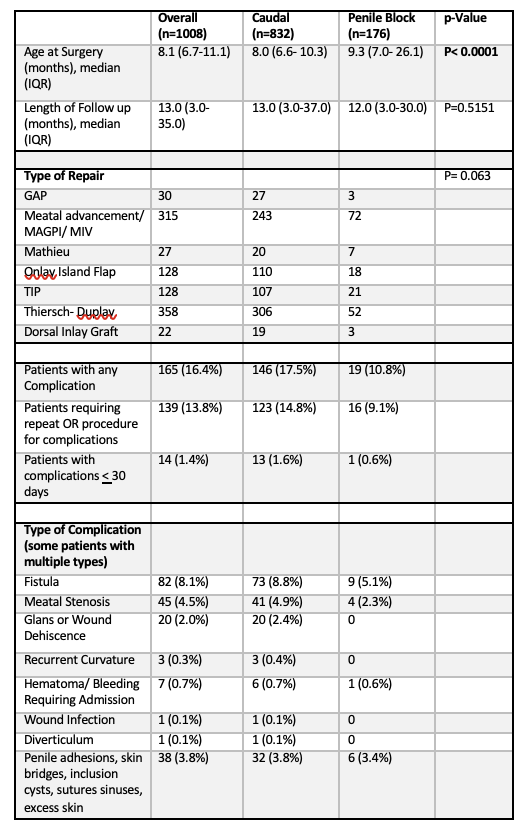Back
Poster, Podium & Video Sessions
Moderated Poster
MP08: Pediatric Urology: Penis & Scrotum
MP08-18: Caudal anesthesia is not associated with complications following distal hypospadias repair
Friday, May 13, 2022
10:30 AM – 11:45 AM
Location: Room 225
Katherine Fischer*, Jason VanBatavia, Nathan Hyacinthe, Sameer Mittal, Karl Godlewski, Stephen Zderic, Aseem Shukla, Arun Srinivasan, Dana Weiss, Thomas Kolon, Douglas Canning, Mark Zaontz, Christopher Long, Philadelphia, PA

Katherine M. Fischer, MD
Children's Hospital of Philadelphia
Poster Presenter(s)
Introduction: The use of caudal anesthesia at the time of hypospadias repair remains controversial as some studies have reported increased postoperative complication rates associated with caudal nerve block. However, these results have been called into question due to confounding factors and heterogeneous study groups. Given the importance of identifying true risk factors associated with increased hypospadias complication rate, we examined our experience with caudal anesthesia limiting our analysis to distal repairs. We hypothesized that caudal anesthesia would not be associated with increased postoperative complications.
Methods: We retrospectively reviewed our IRB approved hypospadias database from June 2007 to January 2021. All boys who underwent single-stage distal hypospadias repair with either caudal or penile block and minimum 1 month follow up were included. Records were reviewed to determine the type of local anesthesia, type of repair, all complications, and time to complication. Association between any complication and local anesthesia type was evaluated by univariate and multivariate logistic regression analysis controlling for age at surgery and type of repair. A sub-analysis was performed for complications occurring < 30 days.
Results: Overall, 1,008 boys were included, 176 (17.5%) who had penile nerve block and 832 (82.5%) caudal at the time of repair. Median age at repair was 8.1 months and median follow up time 13 months. Overall complication rate was 16.4% with 13.8% of patients requiring repeat operation and median time to complication 322 days (IQR= 98-990). Caudal anesthesia was associated with higher likelihood of complication on univariate analysis (OR 1.7, 95%CI=1.1-2.9; p=0.03). This association did not hold up on multivariate analysis when controlling for age and type of repair (OR=1.3, 95%CI=0.8-2.2; p>0.05). Caudal anesthesia was not associated with increased likelihood of complication <30 days on either multivariate or univariate analysis.
Conclusions: After controlling for possible confounders, caudal nerve block was not associated with increased risk of postoperative complications following distal hypospadias repair. The major strengths of this study are a large, homogenous study population, robust follow up and inclusion of data from 14 surgeons over 14 years.
Source of Funding: This work was supported in part by the 2021-2022 Urology Care Foundation Research Scholar Award Program (KF).

Methods: We retrospectively reviewed our IRB approved hypospadias database from June 2007 to January 2021. All boys who underwent single-stage distal hypospadias repair with either caudal or penile block and minimum 1 month follow up were included. Records were reviewed to determine the type of local anesthesia, type of repair, all complications, and time to complication. Association between any complication and local anesthesia type was evaluated by univariate and multivariate logistic regression analysis controlling for age at surgery and type of repair. A sub-analysis was performed for complications occurring < 30 days.
Results: Overall, 1,008 boys were included, 176 (17.5%) who had penile nerve block and 832 (82.5%) caudal at the time of repair. Median age at repair was 8.1 months and median follow up time 13 months. Overall complication rate was 16.4% with 13.8% of patients requiring repeat operation and median time to complication 322 days (IQR= 98-990). Caudal anesthesia was associated with higher likelihood of complication on univariate analysis (OR 1.7, 95%CI=1.1-2.9; p=0.03). This association did not hold up on multivariate analysis when controlling for age and type of repair (OR=1.3, 95%CI=0.8-2.2; p>0.05). Caudal anesthesia was not associated with increased likelihood of complication <30 days on either multivariate or univariate analysis.
Conclusions: After controlling for possible confounders, caudal nerve block was not associated with increased risk of postoperative complications following distal hypospadias repair. The major strengths of this study are a large, homogenous study population, robust follow up and inclusion of data from 14 surgeons over 14 years.
Source of Funding: This work was supported in part by the 2021-2022 Urology Care Foundation Research Scholar Award Program (KF).


.jpg)
.jpg)